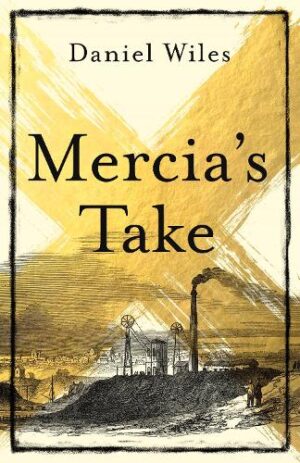Michael Cash believes that coal mining has stolen his boyhood, blighted his adulthood and may well send him to an early grave. In the brooding Mercia’s Take by Daniel Wiles, we join him in the dark heart of the English industrial revolution as he battles to save his young son from the same fate. Desperation, vengeance, and the unholy lure of gold, drives a tale where the blackness seeping into Michael’s lungs threatens to invade his very soul.
Home is ‘the smell of hot gravied soup,’ potato and leek most days, accompanied by a loaf of bread if funds allow. Home is also wife Jane and 6-year-old son, Luke, his imminent induction to the local school another alarming drain on the family coffers. Although government legislation has banned young children from working in the mines, it’s common knowledge that the pit inspectors can be persuaded to turn a blind eye and Michael is haunted by the fear of Luke following in his footsteps.
‘A child working and living in perpetual dark therefore yielded only dark.’
Determined but failing to earn enough to keep Luke in school, Michael is bone-weary and sporadically coughing up dark phlegm. Church is his last resort, where he kneels and prays for the Lord to bestow some good fortune upon his beleaguered family.
Whether by divine intervention or not, Michael’s prayer is answered while hewing coal during an arduous night shift, ‘…inside the wall a small fleck of shine…’ Button-sized nuggets of gold. That evening, Michael and Jane examine them by candlelight.
‘…whereupon they worshipped this newborn light. All that it held. Wealth. Change. Life.’
Michael surmises that there may be a vein of gold running through the wall of the mine. It will be impossible to keep it a secret. Could he trust his new workmate, Cain? As is often the case in these scenarios, the answer is a resounding no, and here the story really takes off as Michael and Cain pit wits in their gold-fuelled fervour. Deception, blackmail, and a grimly eventful barge journey takes place against the fuliginous backdrop of the 1870’s industrial Midlands.
Mercia’s Take is a wonderfully cinematic read, rich with imagery. Giant chimneys stab the landscape ‘like some massive nails driven into the palms of the land,’ and the pit itself is a broiling, malevolent presence, suffocating the men, women, and children who are yoked to the subterranean in the name of Victorian economic progress.
Industrialisation sowed the toxic seeds of climate change, and Wiles imagines the mines as wounds inflicted on the earth, their poisonous breath in stark contrast to the vibrant loveliness of the surrounding countryside. Michael’s walk to work takes him past fields of golden barley and hedgerows alive with bird and insect life, a habitat whose future fragility would’ve been unimaginable in the nineteenth century.
Although excellent on aspects of mining history and ringing with the dialect of the Black Country, you’ll find no joyful colliery brass bands or civic pride in this compelling but bleak novel. A dark and impressive read from one of The Observer’s 10 best debut novelists of 2022.
Mercia’s Take by Daniel Wiles is published by Swift Press, 208 pages.





